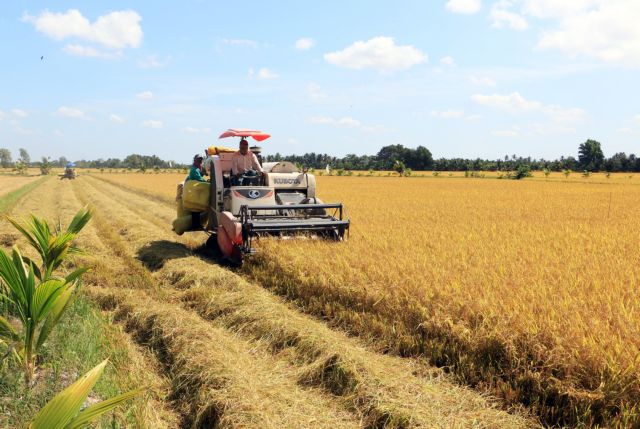 Society
Society

 |
| Rice fields in Vĩnh Long Province’s Tam Bình District. – VNA/VNS Photo Phạm Minh Tuấn |
VĨNH LONG – Vĩnh Long Province plans to develop concentrated and large-scale growing areas for certain crops to increase their quality, production efficiency and added value.
The Cửu Long (Mekong) Delta province also aims to develop linkages between various stakeholders in growing and selling products made from them to increase farmers’ incomes and exports, according to its People’s Committee.
It has identified rice, sweet potato, Năm Roi grapefruit, green skin and pink flesh grapefruit, and king orange as key items and mango, longan, rambutan, durian, jackfruit, and coconut as promising one.
It has more than 178,000ha under these plants, with rice accounting for 112,300ha followed by king orange with 17,734ha.
It plans to sustain this area until 2025 and targets annual output of 2.7 million tonnes before reducing it to 169,500ha by 2030.
Some 25 per cent of the land will see the adoption of good agricultural practices (GAP) and other equivalent quality standards by 2025 and 40-50 per cent by 2030.
The corresponding rates for efficient irrigation systems will be 20-30 per cent and 30-40 per cent.
Currently few farmers have adopted GAP and other standards and linkages between stakeholders are negligible, the People’s Committee said.
To meet the targets, the province will take various measures to develop key and potential plants, including using advanced farming techniques and developing outlets and processing.
It plans to attract investments in processing the products of these plants and encourages companies to collaborate with farmers to develop concentrated and large-scale growing areas for them.
It also aims to support individuals and organisations in developing brand names for the products of key and potential plants, implementing trade promotion activities, and expanding official exports to demanding markets such as Japan, the US, South Korea, Russia, and the European Union.
Its Department of Agriculture and Rural Development has been actively assisting farmers in selling their products on e-commerce platforms and helping agricultural establishments and companies build websites.
It has also been implementing agricultural extension projects to foster hi-tech and organic agriculture, leading to the development of various hi-tech farming models, including the use of polygreen houses to grow plants and automatic irrigation systems.
Farmers adopting these hi-tech models have seen profits increase.
For instance, Huỳnh Phúc Lộc in Vĩnh Long City’s Tân Ngãi Ward grows honeydew melon in seven polygreen houses of more than 1,000sq.m each. It harvests 80 tonnes of the fruit annually, earning VNĐ1.6 billion (US$67,400).
The adoption of hi-tech farming models, such as using polygreen houses and hydroponics for growing vegetables and breeding frogs and eels in mud-free ponds, has been effective and has expanded in the city, according to its Economic Bureau.
The province has been focusing on implementing production codes for plant growing areas to meet export requirements.
Vĩnh Long, known as the delta’s largest sweet potato producing province, has 27 areas with 600ha that have been granted production codes for exporting to China.
It has 38 establishments that have adopted VietGAP or equivalent standards.
In recent years its farmers have shifted to growing fruits that offer higher incomes, making Vĩnh Long the delta's second-largest fruit-producing province after neighbouring Tiền Giang. – VNS




